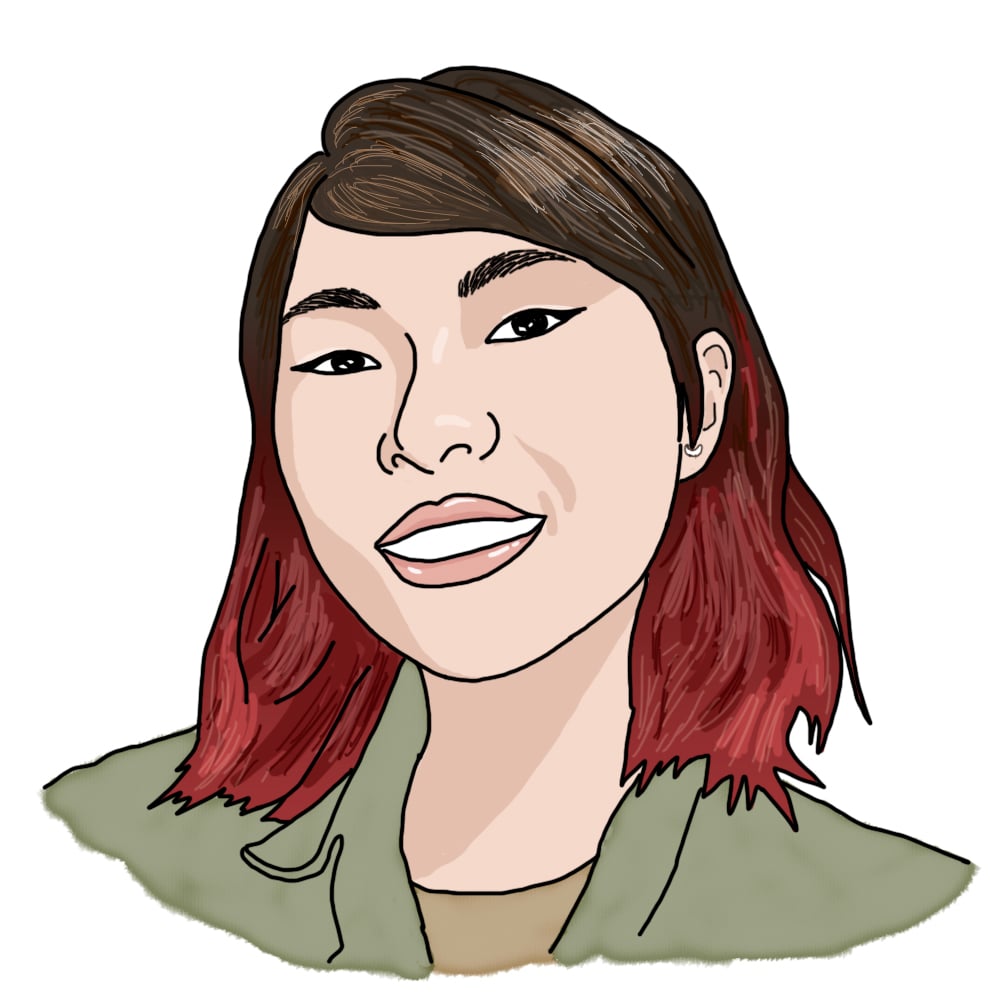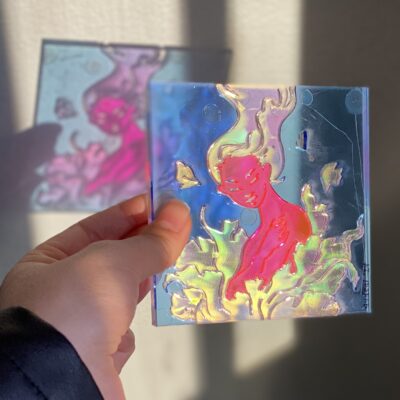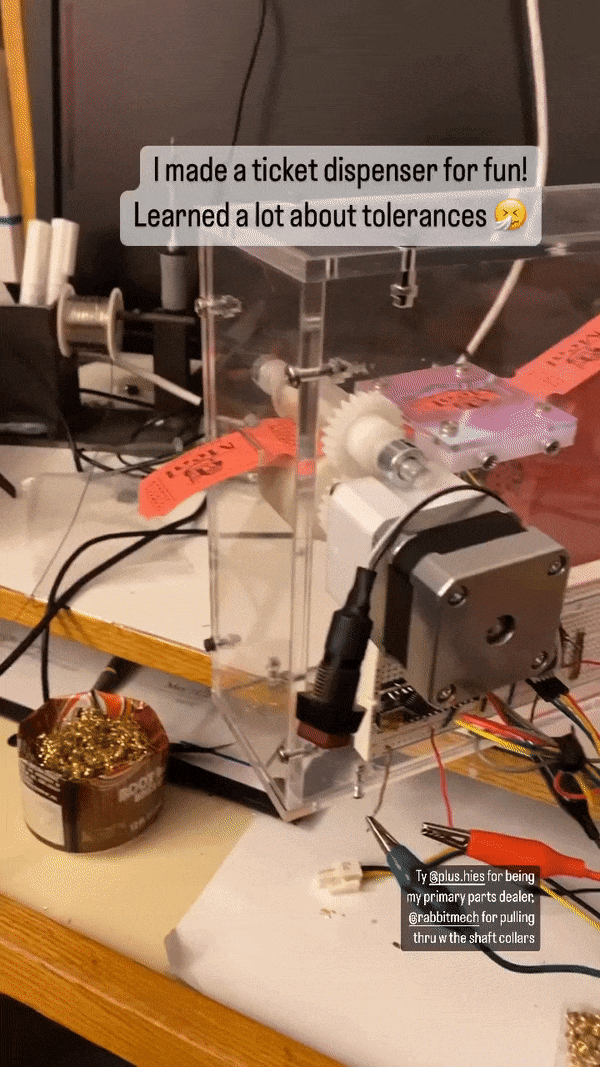
meandering by Audrey C. '24
my nonlinear academic path so far
tl;dr it’s cool to explore interests completely different from what your high school self would’ve expected!
After five semesters at MIT, two change of majors forms, and many advisor meetings initiated by emails with the subject line “help i don’t know what I’m doing with my life!!,” I’ve finally settled on an academic path that I’ll likely stick with! I am currently majoring in 6-901 Computation & Cognition, which is a joint major between computer science and brain & cognitive science. (I love telling people that 'i major in 6-9' for shits and giggles<br /> ) and minoring in 2,02 mechanical engineering and will hopefully graduate as such.
pre-MIT
In response to the application essay question “what department or program at MIT appeals to you,” I wrote:
Pursuing Course 6.3 and UROPing at the Media Lab or CSAIL will give me the tools and the collaborative environment to make my visions a reality.
I actually wrote 6.3 instead of 6-3. Thank you to whoever read my application for seeing past my blunder. I swear I had looked up an official MIT website of some sorts before writing this, but maybe I conflated majors with classes being floating point representations.
I had worked on a computer science research project that started as an independent inquiry, but later got mentorship for it through MIT THINK (a super cool program that high schoolers should apply to!! Deadline for 2023 is Jan 9th, so you might still have a few days). That was my single most impactful academic experience in high school, so it informed a lot of what I was looking forward to in college.
freshman year
As a freshman, I didn’t stray too far from my intended path. I picked up a UROP03 undergraduate research opportunity program in CSAIL04 computer science & artificial intelligence lab that left me starry eyed towards what the world of computer science research has to offer. By the April of my freshman year, I declared 6-9 as my major. 6-9 is a very flexible major: you can decide to focus on the computer science side with a side of brains, or focus on the brain side with a sprinkle of computers, or somewhere in the middle. My intention was to keep pursuing existing interests in computer science, while seeking out ideas from neuroscience to inspire new perspectives, so 6-9 made a lot of sense for me.
While I loved my UROP, the few major related classes I’ve taken up to that point just felt… unsatisfying. Definitely not in a “I’m too good for these classes they’re not rigorous enough for me lol” kind of way, since one of the first things I had to get used to at MIT was never completely understanding what’s going on in my classes. I was unsatisfied because something felt missing from my days of sitting in front of my laptop crunching numbers, latex, or code.
I’m an artist. I’ve always enjoyed making things with my hands. As a kid, that looked like hot gluing together anything I could get my hands on. Although my art practice eventually moved on to 2D media like painting and drawing, it was the physical connection between pencil and paper, brush and canvas that I continued to love. I’ve tried digital art here and there, first with a mouse and then a tablet without pressure sensitivity, but I couldn’t get past the physical disconnect.
Once MIT shipped out fancy iPads complete with a pressure sensitive Apple Pencil, that changed the digital art game for me. Because it appeared as if the motions of my hand were directly translated into digital brushstrokes of varying intensities, I was happy enough. Even if the Apple Pencil couldn’t completely emulate the slight bounce and twang of a paintbrush moving pigmented water across coarsely textured paper, drawing on an iPad required way less setup than preparing a traditional painting. Alas time is scarce at MIT. The cookie tin full of paints I brought with me to MIT sat idle as I hatched away on my iPad.
On top of all of my academic and artistic pursuits involving staring at screens, covid restrictions made it so that very few in person, hands-on activities were permitted during my freshman year. I just wished to be that kid recklessly hot gluing things together again. Lucky for me, one of the few things that were happening were trainings at the Metropolis Makerspace! I learned how to 3D print and lasercut something for the first time. Lasercutting files require vector formats, and I’ve made a ton of vector graphics for my high school clubs, so that was something I could immediately get into. I spent a lot of my free time that semester lasercutting boxes and knick knacks with increasingly ornate designs.

sophomore fall
As sophomore year started approaching, I thought a lot about how much I enjoyed being in the makerspace, making physical objects that were beautiful. What if I also learned how to make things that were functional? That worked? I considered ‘relying’ on my UROP as my source of passion for computer science, but why should I take classes that I knew I wouldn’t completely like, when I could be taking classes that I’d actually enjoy? Later during East Campus’s REX fort construction, I learned how to use an impact driver, a chop saw, and a decking screw gun, another empowering experience.
Feeling inspired by Amber’s blog about declaring course 2A, I filled out my first change of major form two weeks before the beginning of sophomore fall.
Switching to 2A05 one of the two mechanical engineering degree programs, 2A in particular has a set of mechanical engineering requirements and a concentration requirement that basically lets any 6 classes focused on a particular area (ex. bioengineering, computer science, etc) count towards graduation was the right move. For starters, I had no idea that course 2 had a considerably stricter and longer string of prereqs leading up to its cool project classes in comparison to course 6, until my new major advisor told me so. I showed up to the advisor meeting with one set of classes to register for and walked out having registered for a completely different set of classes. In order to take 2.007 Design & Manufacturing I (the robot competition class) in the spring with most of the other MechE sophomores, I needed to take 2.001 Mechanics & Materials I and 18.03 Differential Equations in the fall. I didn’t feel like much of a “real” MechE major at that point since both classes were structured around pen and paper psets, but I did find a greater sense of community within course 2 than I had in course 6.
sophomore spring
Finally time for 2.007! 2.007 was what one might call a “lifestyle class.” I’d sleep earlier in order to wake up early to use the machines before they got crowded and squeeze in machine shop hours whenever I could, culminating in an average of 15-20 hours spent on that class per week. Beyond 2.007 simply being a demanding class, part of why I poured so many hours into it was that I felt behind in comparison to my peers, most of whom had done high school robotics. My high school had a great robotics team that I didn’t join.
But the other reason of why I was so willing to schedule my life around 2.007 was that I genuinely enjoyed making something physical with my hands— I got to see how 2.001 concepts translated into real life practice, tighten screws at inconvenient locations, feel the force of a lathe bit cut into a piece of aluminum spinning at 700 rpm. Even though I came in with little practical experience, I ended the class having learned how to use most of the once intimidating machines in the shop. And that was so immensely empowering.
I also took 2.678 Electronics for Mechanical Systems, whose final project was to code a bot that followed a lined path as quickly and accurately as possible. The instructor also gave us the liberty of throwing away either objective to just make something “cool.” So my partner Tiffany ’24 and I wrote up a reinforcement learning algorithm called Q Learning. The robot learns a lookup table of decisions (turn left, turn right, go forward) based on various states (reflectance sensor readings). Although our robot was very slow and struggled with tight turns due to the limited storage capacity of an Arduino, we were commended for being the first team in the history of the class to teach the robot how to learn, rather than than how to follow a line. My ex-course 6 self was excited that my background knowledge actually came in handy in a MechE classroom.

Our robot, affectionately named “Head Thoughts” short for No Thoughts Head Empty, trying to learn how to follow a line. She’s struggling a bit but she’s got the spirit.

Our prof said that he’d be impressed if our bot would follow a curve of any diameter. We are very proud of Head Thoughts for her valiant efforts. Sorry for the choppiness; I had to compress this gif a lot to get it to upload :'(
junior spring
Come junior year, I was hit by the realization, “Dude you should actually figure out what you’re going to do with your life.” The truth was (and still is) that I’m much more employable in computer science than in mechanical engineering. I could actually give thoughtful answers to computer science interview questions and wax poetic about my research experiences.
Everyone at career fairs, no matter what industry, wanted a machine learning (ML) person. There was a power tool company wanting someone to apply ML to power tools, a waste management company who wanted someone to apply machine learning to waste management, you get the point. I even applied to a sensors company explicitly stating that I wanted to work on something that wasn’t ML because I wanted to try something new, and proceeded to get an offer to work on ML.
I’m thankful to be employable in the first place, and I’m proud of myself for getting to a point where getting pigeonholed into ML jobs is a “problem.” It just meant that I was once again at a crossroads, wondering if I should switch back to 6-9 to get better at what I already know well or fully commit myself to course 2A.
Since I was significantly behind on 2A graduation requirements in comparison to 6-9, I decided that I didn’t want the stress of wondering if I can graduate on time. 6-9 had enough flexibility to also let me explore a bit of hardware and electrical engineering. I’ve previously avoided these areas since I thought electrical engineering = circuits06 </span>EE is in fact so much more than just circuits :o and I didn’t like the circuits part of 8.022.07 Physics II: Electricity & Magnetism, which satisfies one of the physics general institute requirements A course 2 minor lets me pick and choose any 6 MechE classes; so even more flexibility. I anticipate that my senior year will be blessed with more MechE lifestyle classes.
So I meandered back to 6-9 and added a course 2 minor.
now
Hindsight is telling me that maybe I should’ve declared 2A or 6-208 electrical engineering & computer science major from the get go to optimize for both enjoyment of classes and completion of a degree. But imagine going through college without a single crisis concerning your academic path! Beyond predicting the future with 100% accuracy simply not being possible, it’s hard to have foresight when there’s a firehose constantly spraying into your face. Switching into 2A was honestly terrifying, but it was I needed to explore new pathways that I’ve initially never considered for myself. I’ve also gained the confidence to simply try new things, to be okay with being clueless in the beginning, to trust that I’ll become less clueless with time. I still do have passion for computer science; I’m just thankful that I’m getting to pursue interests in conjunction to that.
The perpetually anxious bit of me fears that I’ll emerge from MIT as a half baked computer scientist and a quarter baked mechanical engineer whose neuroscience knowledge is at best useful for small talk topics.09 I love talking about how babies are smart and AI is stupid though. But I know that there’s great value in interdisciplinary knowledge. My 2.678 bot is an example of this. Every time I come across a tenured professor’s website with an entire laundry list of research interests, I’m reminded that it is a culmination of decades of exploration.
Anyways, this blog was a long winded way to say that it’s perfectly normal for you to come out of high school wanting one thing and realizing down the road that you want something else. This makes sense especially for fields like nuclear engineering, which are relatively harder to get exposure as a high school student. It may not look like my path has deviated much on paper since I’m still a course 6-9, but I never thought I’d spend so many of my nights CADing instead of debugging segfaults.10 infamous GPU error sthat don't tell you what went wrong, so fixing these are a pain

an arcade ticket dispenser I made for fun! I learned how to SLA print, cut chamfers on a lathe, design T slots for holding together an acrylic box, drive a stepper motor, and hold myself together when things didnt fit together and I had to remake a few parts :’). thank you to Winnie ’24 for supplying the electronic parts (including not one but two stepper drivers because I blew one up) and to Juliana ’24 for supplying shaft collars.
As for exactly what I want to do after graduation? I’m still not sure and should figure that out fast. I’m fairly sure that I want to pursue a PhD sometime in the near future since I love research in an academic setting, but whether I want to do this immediately after graduation and exactly what topics I want to investigate remains an open question. Hopefully I’ll narrow down my options through a new UROP this spring or maybe through a summer opportunity. For now, I’m okay with this uncertainty.
- Computation & Cognition, which is a joint major between computer science and brain & cognitive science. (I love telling people that 'i major in 6-9' for shits and giggles ) back to text ↑
- mechanical engineering back to text ↑
- undergraduate research opportunity program back to text ↑
- computer science & artificial intelligence lab back to text ↑
- one of the two mechanical engineering degree programs, 2A in particular has a set of mechanical engineering requirements and a concentration requirement that basically lets any 6 classes focused on a particular area (ex. bioengineering, computer science, etc) count towards graduation back to text ↑
- EE is in fact so much more than just circuits :o back to text ↑
- Physics II: Electricity & Magnetism, which satisfies one of the physics general institute requirements back to text ↑
- electrical engineering & computer science major back to text ↑
- I love talking about how babies are smart and AI is stupid though. back to text ↑
- infamous GPU error sthat don't tell you what went wrong, so fixing these are a pain back to text ↑